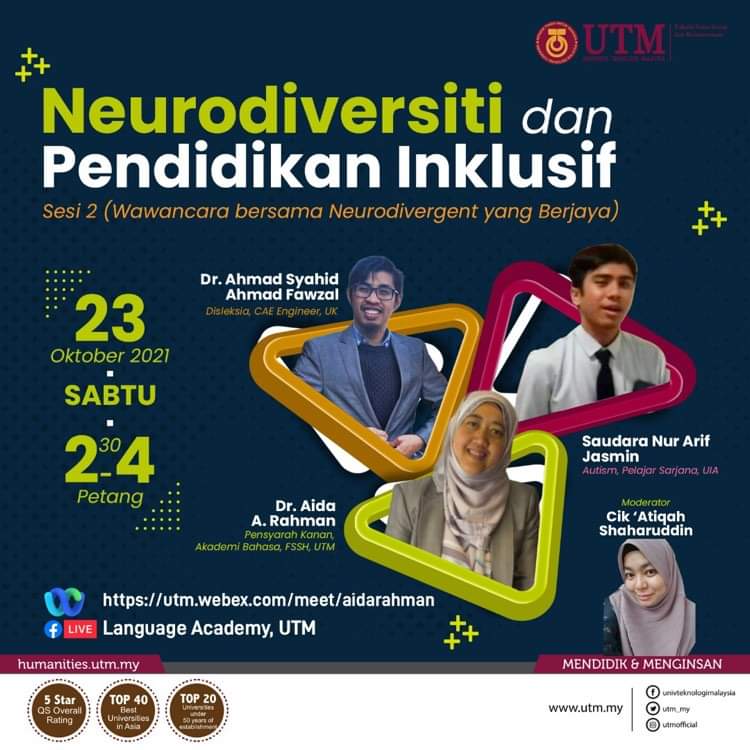By Rafiqi Yusoff
KUALA LUMPUR, 24 October 2021: Having differences in regard to individual brain functions as well as behavioral traits are not a hurdle for a person with learning disabilities to equally bring success as other normal human beings.
A virtual conference was held by the Language Academy, Universiti Teknologi Malaysia (UTM) to raise public awareness that people with learning disabilities, scientifically known as neurodivergent, undoubtedly can achieve success as other normal human beings, or known as neurotypical.
Joining the virtual conference were Dr. Ruzita Mohd Amin, the Head of IIUM Disability Service Units (DSU), and Dr. Aida Rahman, a senior lecturer from the Faculty of Social Sciences and Humanities, UTM, who is also a member of Centre for Research in Inclusion, University of Southampton, United Kingdom.
Dr. Ahmad Syahid Ahmad Fawzal, better known as Dr. Aid Fawzal, a Malaysian engineer in the United Kingdom was officially diagnosed with dyslexia, a learning difficulty that impairs a person’s ability to read and write, when he pursued his studies at master’s level at Cranfield University, United Kingdom in 2011.
As a dyslexic person, Dr. Aid shared that his ways of learning are different from normal people in which he started hands-on lessons first rather than theoretical lessons, where normal students typically learn theoretical lessons first before getting into practical lessons.
Dr. Aida pointed out in relation to Dr. Aids learning preference that multi-sensory learning is a suitable approach for the neurodivergent individuals due to the fact that their brain functions differently compared to other normal human beings.
œThe multi-sensory learning approach is crucial to boost up their academic achievement. Therefore, the teaching methods should be in accordance with their learning preferences, she remarked.
Dr. Aid had successfully invented Fawzal number (Fa), a dimensionless quantity that describes the ratio of convective heat transfer or cooling capacity over its power consumption to drive the coolant medium. The number was introduced earlier as the Rotor Cooling Performance Index.
He introduced the formula in his PhD study with YASA Ltd, Oxford, United Kingdom at Coventry University in 2015. The Fawzal Number (Fa) is in conjunction with his father’s name, Ahmad Fawzal. The concept has been widely used by leading supercar and hypercar manufacturers.
His great contribution towards technology today has proven that neurodivergent individuals are also capable of being as successful as other normal human beings.
Dr. Aida further clarified that the intelligence quotient (IQ) of neurodivergent individuals are at the same level as neurotypicals. Somehow, their IQs are capable of being at a higher level than neurotypicals.
œDr. Aid is an epitome which is comparable to Einstein, who is from Malaysia, a neurodivergent like him has his own advantage which Allah has granted, according to Dr. Aida.
Meanwhile, Nur Arif Jasmin, an autistic postgraduate student of Quran and Sunnah Studies, from the Kulliyyah of Islamic Revealed Knowledge and Human Sciences, IIUM, revealed his experience of learning by using Power Rangers robot toys to help him in his studies.
According to Arif, he has used four of his Power Rangers robot toys as representation of Islamic Schools of Jurisprudence such as the green robot acts for Hanafi, the blue robot acts for Syafie, the Red robot acts for Maliki, and the golden one acts for Hambali.
He has created sort of dialogues and drawings of those Power Rangers, and gave them characters as a solution simply to help him understand his lessons since he has difficulties reading all the thick Islamic books (kitab).
Dr. Aida affirmed that autistic people in general have an obsession towards something. And for Arif, he is highly preoccupied with Power Rangers robot toys and he channels his obsession towards his studies.
Arif also shared how he received all kinds of support from IIUM Disability Service Unit (DSU) during his presence around the campus.
He has consistent difficulty crossing the streets. Hence, the DSU had assigned the ˜special buddies to help him crossing the streets so that he would not be late to attend physical classes. Plus, he mentioned that the DSU helped draw a map as a directory for him to look for class locations everyday.
Arif also said that he was also assisted by the Department of Quran and Sunnah Studies regarding his study plan in terms of how many subjects, what subjects he should take according to semesters since he had difficulty to do on his own.
However, Dr. Aid Fawzal also revealed that he had received similar support as Arifs from his alma mater in a sense that the deadline of submissions and the examination period had been prolonged specifically for him.
Dr. Aida, however, expressed positive opinions depending on Arifs detailed account towards the DSU in which she believed that IIUM has produced a good-natured community as well as practicing a healthy culture by offering a service to those students with specific disabilities.
This virtual conference, conducted via Webex platform on Friday (23 October) and streamed live on Facebook page of Language Academy, UTM, was educative.
It had pointed out important matters regarding the potentiality of the neurodivergent individuals to be as successful as normal people.***
